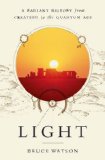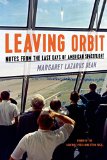Summary | Excerpt | Reviews | Beyond the book | Read-Alikes | Genres & Themes | Author Bio

A Portable History of the Universe
by Christopher PotterYou Are Here is a dazzling exploration of the universe and our relationship to it, as seen through the lens of today's most cutting-edge scientific thinking. Christopher Potter brilliantly parses the meaning of what we call the universe. He tells the story of how something evolved from nothing and how something became everything. What does a material description of everything and nothing look like? What is it that science does when it describes a reality that is made out of something? In between nothing and everything is where we live.
Here, for the first time in a single span, is the life of the universe, from quarks to galaxy superclusters and from slime to Homo sapiens. The universe was once a moment of perfect symmetry and is now 13.7 billion years of history. Clouds of gas were woven into whatever complexity we find in the universe today: the hierarchies of stars or the brains of mammals. Potter writes entertainingly about the history and philosophy of science, and he shows that science advances by continually removing humankind from a position of primacy in the universe, but the universe responds by placing us back there again.
With wisdom and wonder, Potter traverses the cosmos from its conception to its eventual end—while exploring everything in between.
You Are Here is simply an amazing book. Christopher Potter takes his readers on a whirlwind tour that races from the vastness of the universe to the subatomic particles that make up all of creation, touching on scientific theory, history, and even evolution along the way. It is a fascinating journey that can leave one's head spinning. There is a lot of information packed into this slim volume. ...
... The reader is advised to peruse an excerpt before picking up a copy - You Are Here will not be everyone's cup of tea; and it's not a book that can be easily read in an environment full of distractions. Regardless of its difficulty, however, I did find the information Potter presented to be fascinating, and I was never tempted to abandon the book...continued
Full Review
 (624 words)
(624 words)
(Reviewed by Kim Kovacs).
 Nicolaus Copernicus was one of the first scientists to remove the Earth (and consequently, humanity) from the center of the universe, countering the theological teachings of his day. As such, his theories are referred to often in You Are Here. He is regarded as one of the central figures of the Scientific Revolution, and is sometimes referred to as the founder of modern astronomy.
Nicolaus Copernicus was one of the first scientists to remove the Earth (and consequently, humanity) from the center of the universe, countering the theological teachings of his day. As such, his theories are referred to often in You Are Here. He is regarded as one of the central figures of the Scientific Revolution, and is sometimes referred to as the founder of modern astronomy.
Copernicus was born Mikolaj Kopernik on February 19, 1473 in the Polish town
of Torun, the youngest of four children. His father was a wealthy copper trader
active in local politics (kopernik translates as "one who works with copper"), who died when Copernicus was still young. His maternal
uncle, Lucas Watzenrode, became guardian to Copernicus and his ...

If you liked You Are Here, try these:

by Bruce Watson
Published 2016
Although lasers now perform everyday miracles, light retains its eternal allure. "For the rest of my life," Einstein said, "I will reflect on what light is." Light explores and celebrates such curiosity.

by Margaret Lazarus Dean
Published 2015
Winner of the Graywolf Press Nonfiction Prize, a breathtaking elegy to the waning days of human spaceflight as we have known it.